
Introduction
Among the WEC International mission stations in the Belgian Congo, and their hundreds of associated churches, the passion for Christ developed a cooling off. Though there was lots of activity with meetings, medical work, hundreds of children in mission schools, etc., the spiritual climate was cold; people did not come to the prayer meetings or Bible studies as they once had. Those who were getting saved were like Lazarus. They came out of the grave, but they were still bound with grave clothes. The people were going through the religious motions, mostly because it was expected. On the side, secret sins were habitually practiced. One missionary commenting on the spiritual condition said,
We have a good shop window.
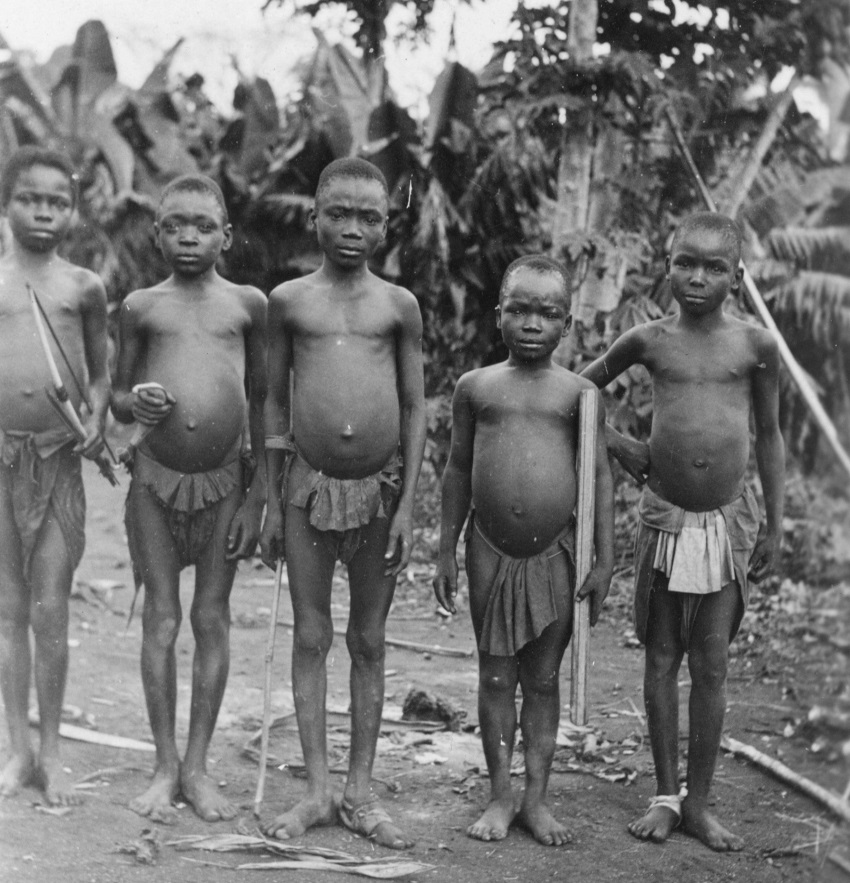
Congolese boys with bow and arrows
Extraordinary Prayer & Preparation for Revival
Due to the extreme coldness among the missionaries and national believers, there was a call to make a commitment to spend at least one day each month in prayer. For those who made that commitment, they soon discovered how cold their hearts had truly become.
At the Opienge mission station specifically, the missionaries had been reading stories of the Korean revivals to those assembled at their meetings, like the one at Wonsan in 1903, and the one in Pyongyang in 1907. The telling and retelling of revival stories had helped spark revivals in the past, and they were anticipating it to have the same effect now.
One missionary at the Ibambi mission station said,
We have longed, prayed, cried, agonized for revival, and when it came, it was beyond anything we had imagined.

What Happened
Lubutu Mission Station
The revival began in the WEC mission station at Lubutu on Saturday night, February 7, 1953. It was during a scheduled worker’s conference, with the national pastors, evangelists, and wives from the area present.
That evening the European missionaries were holding a prayer meeting in their home, while the Africans were having one of their own at the school. It was then that the missionaries heard the noise of wailing and crying coming from the school. They went to investigate, and they found many overcome and prostrate on the ground, shaking violently. Many were standing with their hands raised, worshiping, some confessing secret sins. After a while the missionaries attempted to close the meeting, but it continued for twenty-four hours.
The conviction of sin was at times so intense that people would be in deep agony. Those who resisted confessing their sins were grievously tormented until they yielded. One woman went insane under conviction until she confessed her sin. An evangelist went into a coma for three days, and his healing came after he came to and confessed his sins.
Following confession of sin, their hearts were filled with overwhelming joy. From the surface it appeared as though it was all chaos and confusion. One missionary who was present commented about this scene by using a quote from a prayer written by the famous London pastor, Charles H. Spurgeon.
God, send us a season of glorious disorder.
The missionaries had been praying for a revival, but when it came, it wasn’t anything like what they expected.
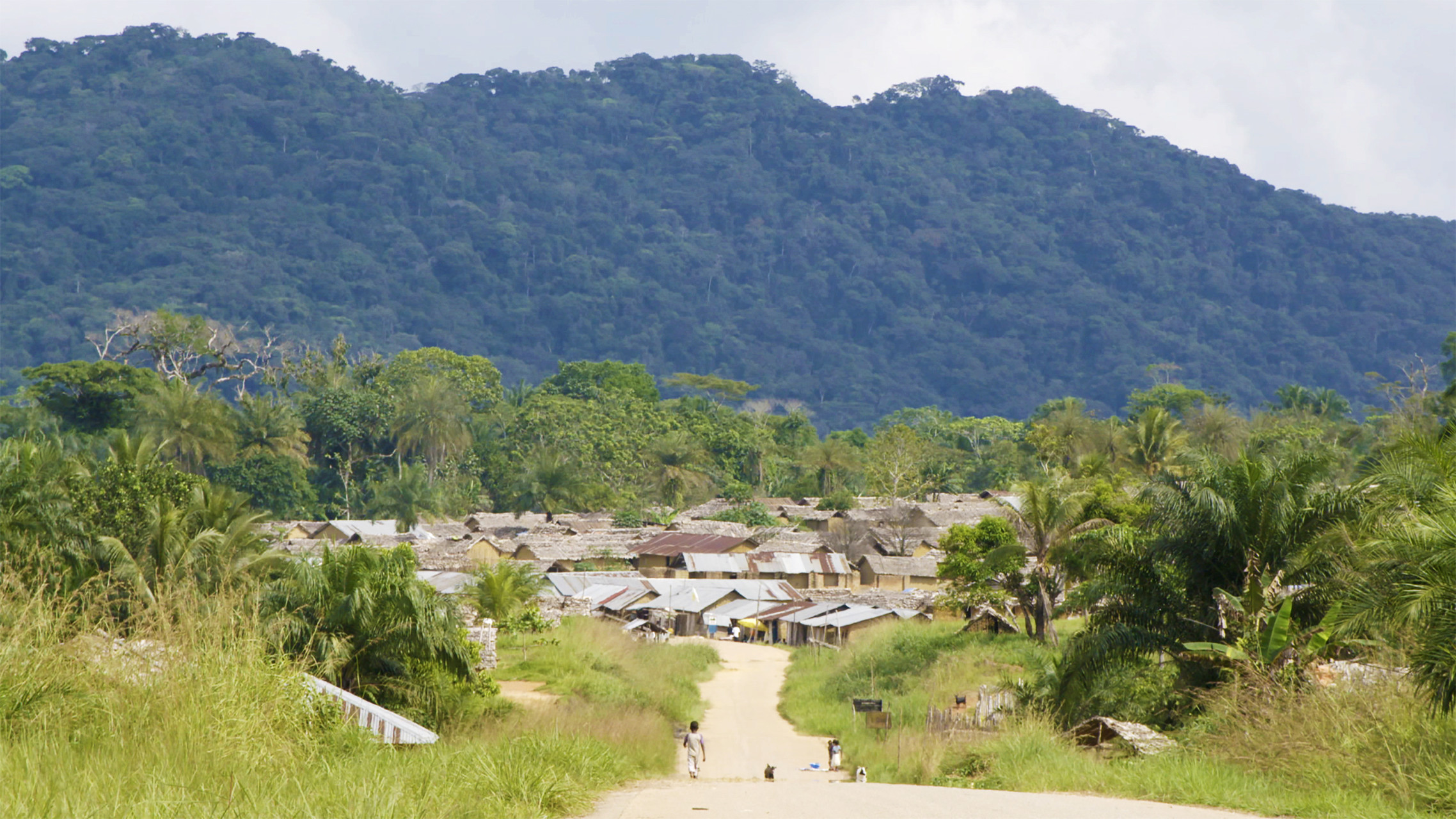
Lubutu village
The Spreading Revival
Missionaries in Lubutu began writing letters to the other mission stations throughout the region, explaining what happened. Initially there was opposition and criticism, but that all soon gave way as the Holy Spirit began to fall on other mission stations as He did at Lubutu. It wasn’t only the WEC mission stations that were affected. Other mission stations and outlying churches throughout the region were also affected.
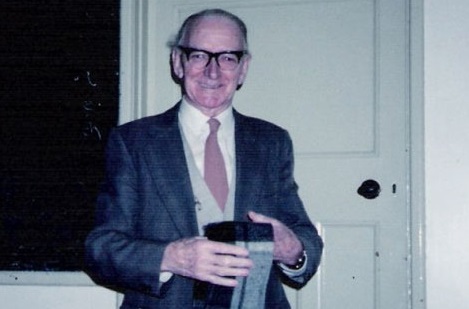
David Davies (photo circa 1992) was a missionary during the Congo Revival
Opienge Mission Station
By May of 1953 the revival had reached Opienge. The leaders had been praying for revival, and when it began to trickle in, they were not aware that it was but the beginning of a much larger outpouring.
The outpouring at Opienge began with several who came under severe conviction of sin. One was an evangelist who had struck his wife with a stick during an argument. That man was so overcome by his sin that he had to be carried into a home where he cried all night, asking God to forgive him.
Several women came to the wife of the missionary and were confessing their coldness of heart, preoccupation with material possessions, and a lack of love for the lost.
Sena, the wife of an elder, began to jerk and shake during a Sunday service. Some thought she was sick, but it turned out the be the Holy Spirit upon her. The same thing happened on Tuesday night to Peleza, another elder’s wife. She had sat up on her bed and was shaking violently, and singing loud praises to God, and she kept saying,
Thanks, thanks, thanks, Lord Jesus.
During the following Sunday service, Peleza again began to tremble and shake beyond her control, even when she was asked to be still.
At about that same time the missionary leading the mission station at Opienge received a vision from God, and it was of the congregation shouting, shaking, and making confession. He confessed his fear and said,
It is one thing to pray for revival, quite another to be willing for it.
On the Thursday of their monthly day of prayer and fasting, it was requested by Peleza that the men and women separate into different rooms, as she wanted to confess something to the women alone.
Once the group separated and had begun praying, in the men’s group, the evangelist who had previously struck his wife with a stick, became agitated and began crying. He ultimately collapsed and fell onto his seat.
There was silence for a few moments, then the chief elder stood with his hands stretched out, shaking and shouting at the top of his voice,
Thanks, thanks, Lord Jesus.
Immediately the entire room was as if it was charged with an electric current. Men were falling, jumping, laughing, crying, singing, confessing, and some violently shaking. The missionary said “it was a terrible sight.”
The women heard the commotion and came to look in the window at the men. They immediately went back to their meeting and the Holy Spirit fell on them as well.
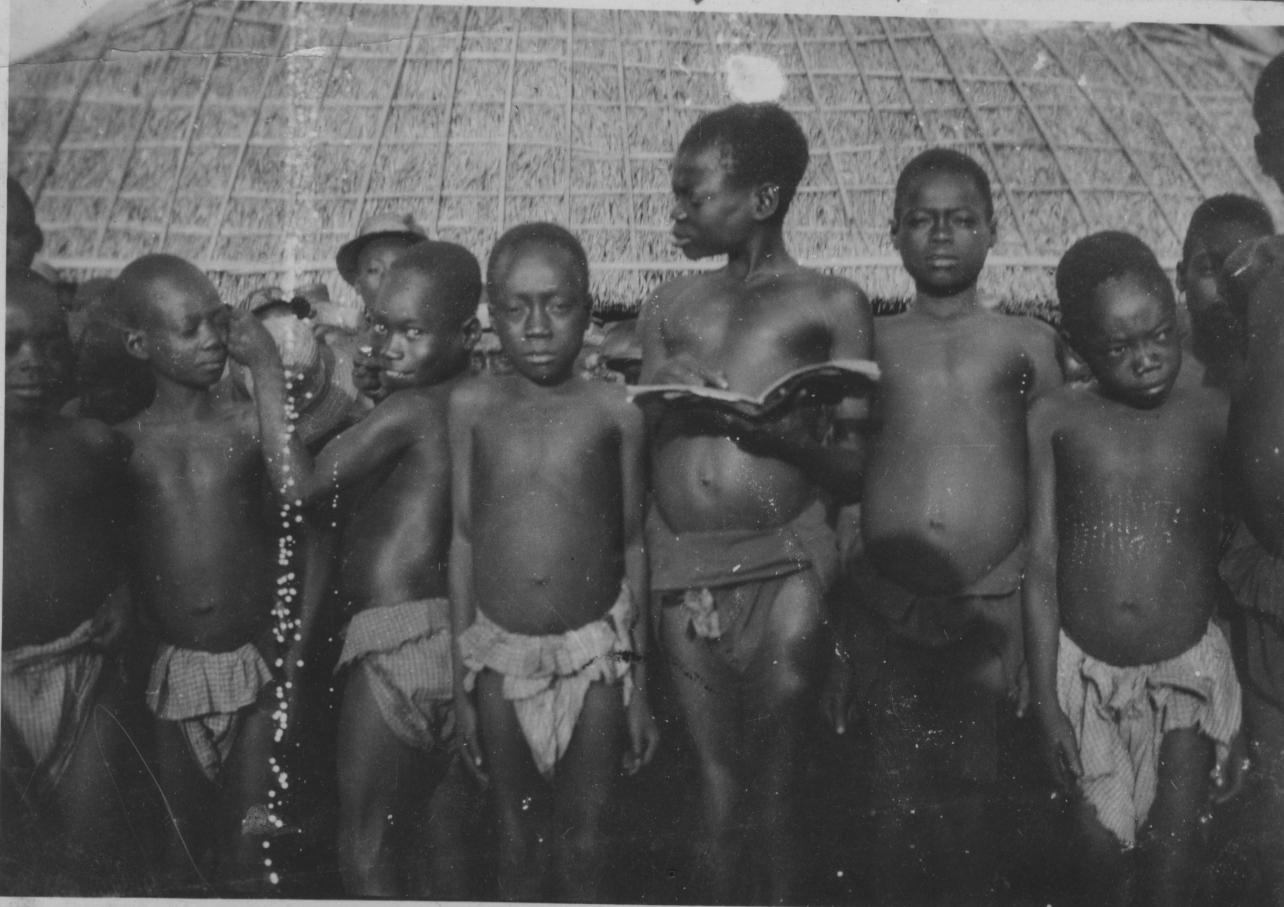
Choir of school boys getting ready to sing
Spiritual Tornado
The leading missionary at the station in Opienge described the situation as a spiritual tornado, as people were literally flung to the floor or over the benches, yet no one was hurt.
News of the outpouring of the Holy Spirit quickly spread throughout the area, and people were walking upwards of 100 miles to come to Opienge to witness and participate in the move of the Holy Spirit.

Some of the WEC International mission station locations where the revival spread. The revival spread out to hundreds of other locations and churches surrounding each location indicated on the map.
Bomili Mission Station
Revival came to the Bomili area when two of the missionaries and several African evangelists arrived from Opienge. At the first meeting there were 800 people present. After two messages, the Holy Spirit fell upon those assembled just as He did at Opienge.
Wamba Mission Station
Beginning on Sunday, July 19, 1953, the revival came to Wamba. One missionary reported;
The conversions have been marvelous: the whole compound is a new place: from missionaries, to workmen and their wives, to schoolteachers and their wives, to houseboys, schoolboys, and schoolgirls—even among those in kindergarten classes.
Similar occurrence accompanied the believers in Wamba as what was being experienced at other locations:
1. Overwhelming conviction of sin was felt, accompanied with trembling, shaking, writhing, prostration, wailing, crying, groaning, and indescribable grief.
2. There was a powerful awareness of the reality of heaven, as well as hell.
3. This torment caused by conviction of sin was said to be “the whip of the Holy Spirit.”
4. Confession of those sins was made.
5. Forgiveness of sins was experienced.
6. Indescribable joy and the infilling of the Holy Spirit was obvious.
7. Restitution was made for things stolen and relationships were restored.
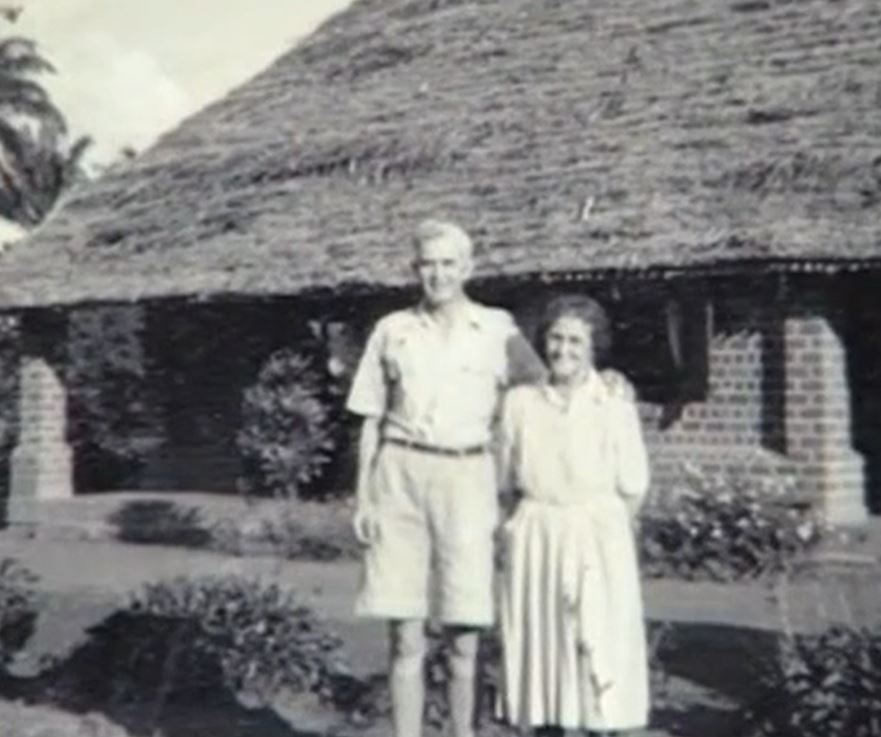
Jack and Jessie Scholes, area leader of WEC International at the time the revival started.
Ibambi Mission Station
On Friday, July 31, 1953, at 7:00pm, one hundred gathered for a weekly fellowship meeting at the Bible School hall at Ibambi. Jack Scholes, who was leading the team of 50 missionaries in the province, shared what he had witnessed in the southern part of the mission area during the previous two weeks.
Suddenly everyone heard the roar of what seemed to be a hurricane. Shutters throughout the hall were quickly closed to prevent the wind from damaging anything. But as they waited, the wind didn’t come, they only heard the sound. When they looked outside, they saw a clear sky, with no movement in the trees. Yet at the same time the lanterns throughout the hall were shaking wildly, and the building seemed to rock. It was like the account in Acts 2:2:
…a sound from heaven as of a rushing mighty wind, and it filled the house where they were sitting.
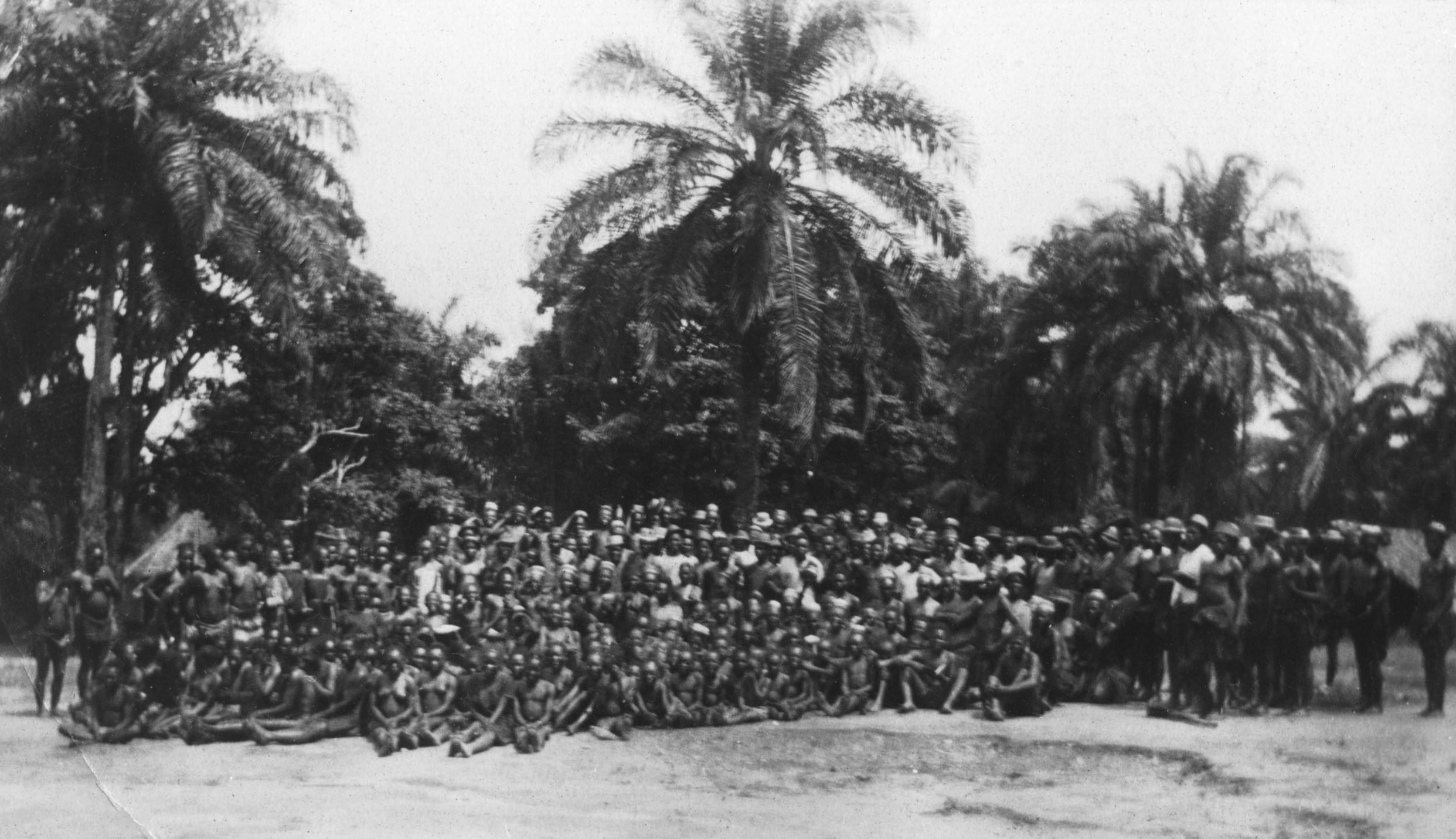
Ibambi Mission Station – probably prior to 1953
The hall was filled with people lying flat on the ground, being hurled there by an unseen force. Nobody was conscious of anyone next to them. It was just the individual and God standing face-to-face. Many began crying out to God for mercy. Others were shaking violently. Some were on their feet with arms outstretched to heaven giving praise to God.
Conviction of sin had fallen upon all present (95 Africans and 5 whites). People with tears streaming down their faces confessed to theft, jealousies, anger, coldness of heart, and having a religious spirit. After the confession it was as if there was a flood of joy that gushed in through the person who had confessed, and their weeping and groaning transformed into songs of praise to God.
It was usual for that 7:00pm meeting to conclude at 9:00pm, but many stayed till 2:00am, with some even staying all night. Through Saturday and Sunday the news began to spread to village after village in all the area surrounding Ibambi. This led to many arriving to experience the same thing as what had happened on that Friday night.
1. People were broken down under the conviction power of the Holy Spirit.
2. They experienced a new realization of the cleansing and forgiving power of Jesus.
3. They were filled with overwhelming joy and they expressed that joy outwardly.
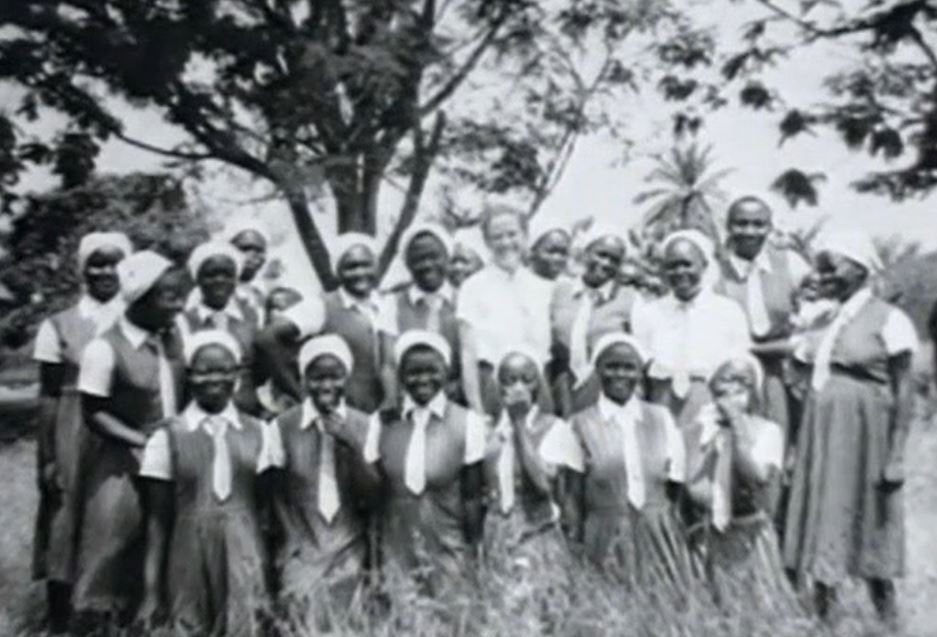
Dr. Helen Roseveare, one of the WEC missionaries (center) with medical school students.
Nebobongo Mission Station
When the news came that a team was coming to Nebobongo from another mission station, some took it upon themselves to be absent when they arrived, as they feared they would bring the revival with them and their sins would be exposed. Others made vows that they would not confess their sins when the Holy Spirit came. Even so, when the team came and began sharing, the exact same thing happened at Nebobongo as what transpired at Ibambi:
1. Awareness of the holiness of God.
2. Deep penetrating conviction of sin.
3. Confession of those sins.
4. Unrestrained joy and jubilation.
Night after night the meetings continued, and they saw repeatedly the same working of the Holy Spirit. The building was packed out, and unbelievers would flock to watch from the outside of the church. Many of those fell to the ground under conviction of sin and ultimately gave their lives to Christ.
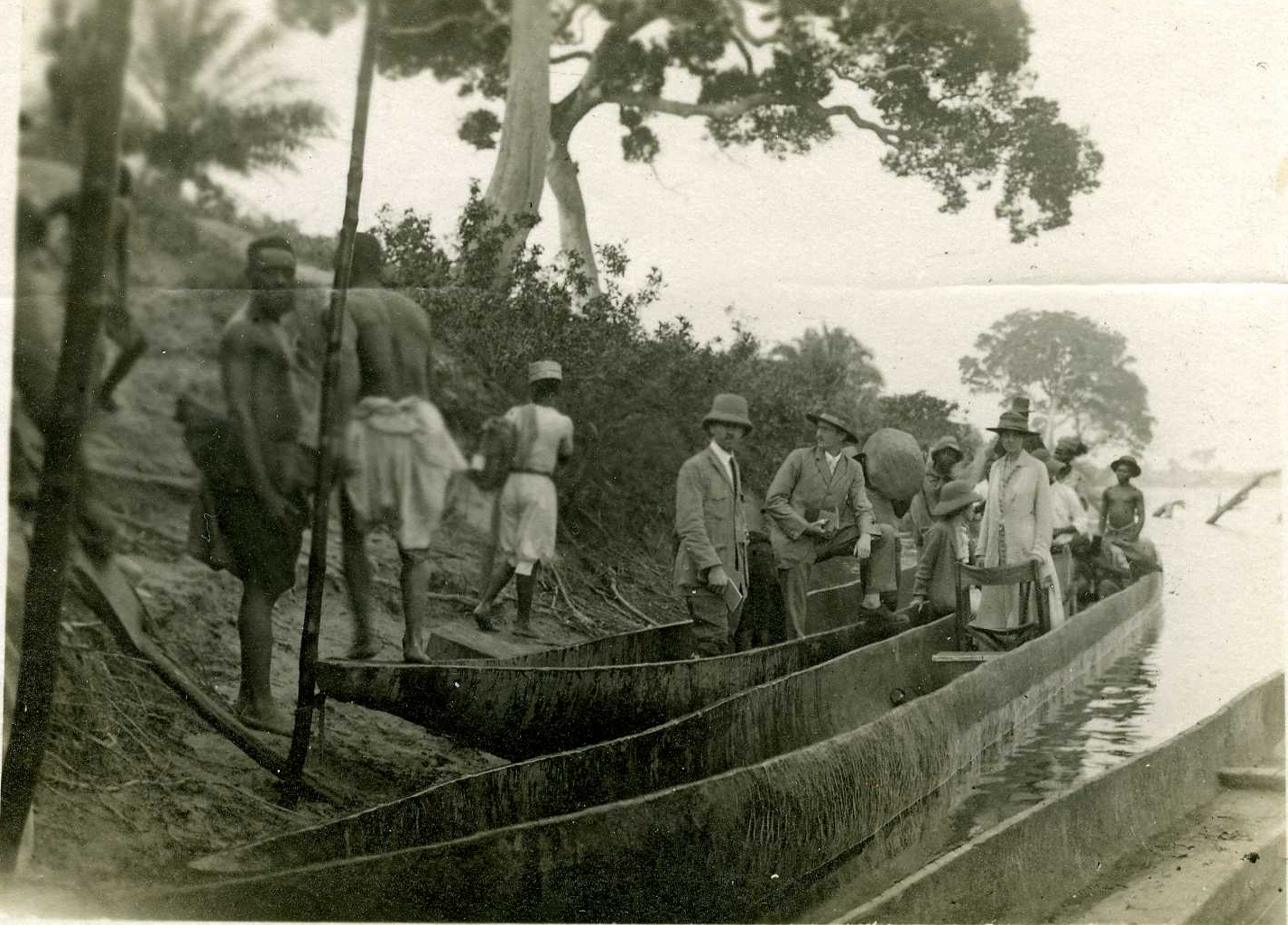
Early missionary arrivals in the Congo: circa 1920s
Results of the Revival
► People freely preached about and testified of Jesus’ love wherever they went.
► People were saved by the hundreds and thousands.
► The people were so caught up in the presence of God that they didn’t take time for meals, and they would often sleep only a few hours each night, yet they were not tired.
► Prayers were no longer mechanical, they were heartfelt, and there was an intense desire to intercede for the lost.
► The singing was filled with passion.
► Marriages were restored.
► Many young families (husband and wife) felt the call to attend the Bible School and prepare for preaching and pastoring.
► The mission stations that were experiencing revival began sending teams to other mission stations not associated with WEC International, and those mission stations and churches began to experience the same.
► People did not straggle in or arrive late for the services like they did before–they ran to them.
► Newcomers were at almost every meeting.
► Believers were not ashamed to carry their Bibles in public, as they previously were.
► The Roman Catholic meetings became vacant, as the people left the rituals and joined in the revival.
► Numerous owners of wine palm trees cut down their orchards and were no longer producing wine.
► Restitution of stolen items was made and payment of debts was common.
► Theft from the Belgian government had been so large that the officials couldn’t handle all those wanting to come and confess their crime and return the goods that had been stolen.
► The revival affected the children just as much as the teens and adults.
► Africans changed their pagan-associated names to New Testament names.
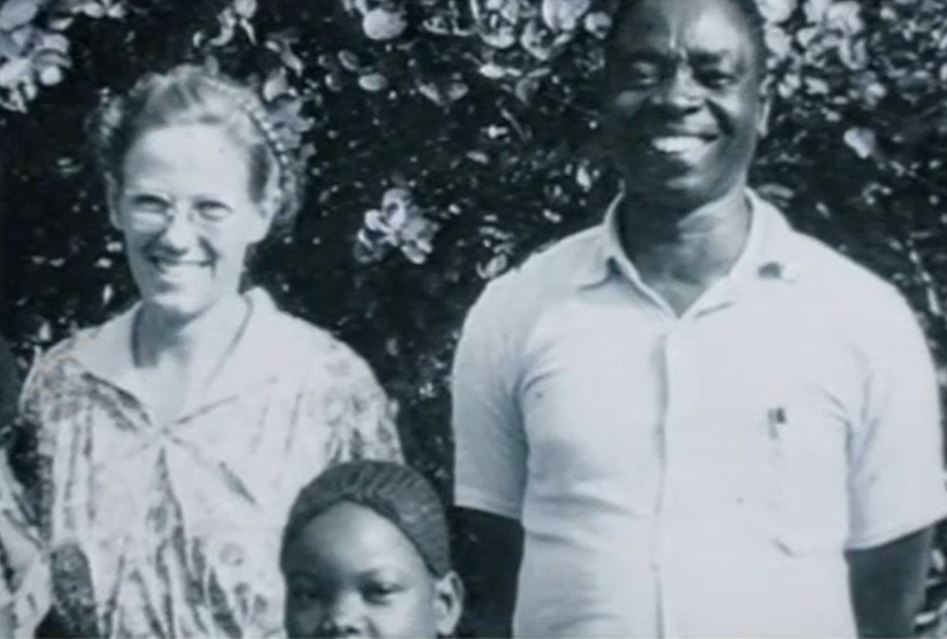
Dr. Helen Roseveare (left) with Pastor Ndugu
Manifestations of God’s Power
► The preaching of the Word of God, which was carried out consistently before the Holy Spirit’s outpouring, now came forth with much greater power.
► Comprehension of the messages preached or taught seemed as though it was the first time they were heard, as they were so fresh and life-giving.
► Conviction of sins was so powerful that people had to confess them before they could be free from the burden of their sin.
► Conviction of sin was at times accompanied by paralysis of the limbs of the affected individual.
► Physical healings were common.
► Prayer was often conducted in unison—everyone praying at the same time. Not confusion, but an orchestrated symphony of prayer, praise, and worship.
► On a number of occasions people reported to having seen a great white light.
► There were many visions, often of the second coming of Christ. Some had visions that originated from the Old Testament, even though they only had a New Testament in their language at that time.
► Many were often so overcome by God’s presence that they were said to be “drunk with the Spirit” (Acts 2:13).
► There were those who attempted to resist the Holy Spirit’s power, but always failed. The torment from the shaking and trembling drove them to confess their sins, as that was the only way relief could be obtained. One missionary reported that it was like the accounts in John Wesley’s Journal.
► Supernatural ability was given to be able to comprehend languages never learned.
► The gift of discernment was granted to enable the leaders to detect what was of God, what was of Satan, or what was just people pretending.
► Hymns were written, some of them given directly by God. One man who had never composed anything before wrote four verses and the tune.
► Ecstasy of joy was experienced following confession of sin and being filled with the Holy Spirit. This was often accompanied with laughter, dancing, praise, and thanksgiving.
► Satan did attempt to infiltrate and disrupt. This came in the form of some who tried to gain attention for themselves by going to extremes. Others gave false prophecies. There were even the demonized who were attempting to say that they were the Holy Spirit, and that they wanted to lay their hands on people and “bless” them.
The Revival’s Endurance
This revival ran across the Belgian Congo from 1953 to 1955. During that time the churches doubled, and then tripled in their numbers. Twelve years later, when civil war tore the country apart, the revived Church had been prepared by God to withstand the onslaught of unbelievable horror and evil. Thirty years later the leaders of the churches were those who were blessed by the revival.
Sources
► Evangelical Awakenings in Africa by J. Edwin Orr
► Give Me this Mountain by Helen Roseveare
► Living Sacrifice by Helen Roseveare
► Mama Luka Comes Home Cross.tv
► REVIVAL: A People Saturated by God by Brian H. Edwards
► Revival in the Congo by Jesus Life
► The Spirit of Revival by Norman Grubb
► WEC International by Wikipedia
WEC International is the source of most pictures on this post.
Audio Testimony of the Congo Revival by the 30-year missionary to the Congo, David Davies
Pictured: Jack & Jessie Scholes, WEC International area leader during the Congo Revival
Return to List of Revival Stories
Chet & Phyllis Swearingen
(260) 920-8248
romans1015@outlook.com
Beautiful Feet
P.O. Box 915
Auburn, IN 46706

